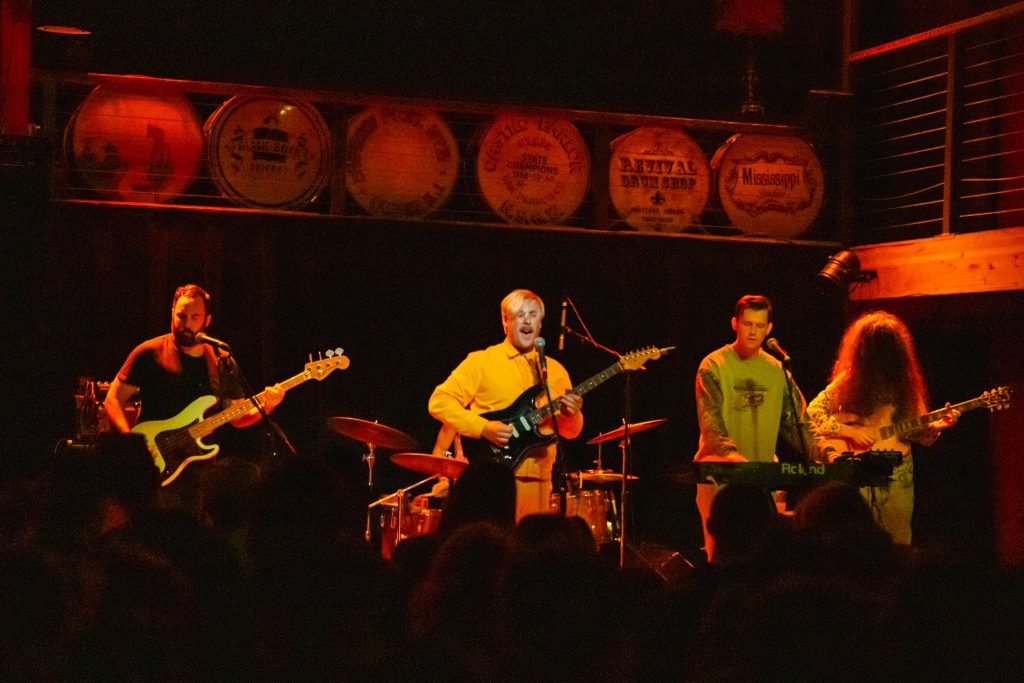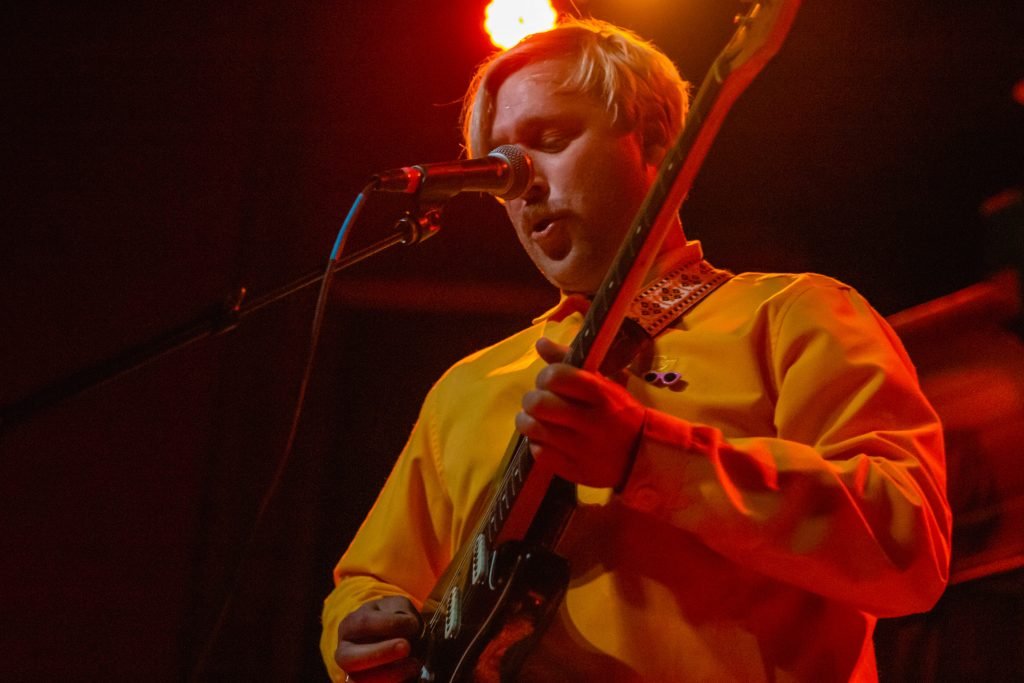Aan


Bud Wilson has been releasing wild technicolor indie rock under the moniker Aan for over 10 years now. In that time, he and a revolving cast of bandmates have released three full-length records, each a cathartic exploration of the darker side of Wilson’s psyche while he navigated personal hardships around love, self-acceptance and death. Each record feels like a more finely honed expression of his musical vision, culminating with Aan’s most recent offering, Losing My Shadow, out on Fresh Selects last month. The new record features washes of synth that soften the hard edges of the band’s usually erratic song structures. It’s dense, with subtle production flourishes, making it apparent that a lot of time and love went into turning each song into its own little universe.
Listen to Aan’s newest single “Fell Into A Hole” out now, off of Paradise Hotel, a collaborative compilation album produced by Jesse Bettis of New Move Media, released on Tender Loving Empire. Don’t miss Aan live at Mississippi Studios, July 24 for the first of two nights at New Move Media’s “hotel party” release show!
11: Has mining such personal territory for lyrical content ever complicated personal relationships with people who served as source material?
Bud Wilson: It hasn’t damaged any relationships that I’m aware of, but my mom just heard it, and she was like, “Well, now that you have all that stuff out of your system, maybe you can write some less complicated music.” The songs on Losing My Shadow are less about romantic relationships, they’re more about the relationship I have with myself. I’m shining a harsh light on a lot of the things that irritate or scare me about myself. It’s kind of an examination of my own mortality and realizing that we’re not here for very long. I’ve been thinking a lot about all the dumb shit you do that can be really fun, but can also end up screwing you over if you’re not monitoring it.
11: Like what?
BW: Drinking, doing drugs… just being really sad all the time. That stuff can be really destructive because you never cut yourself a break. I try to hold myself to a pretty high standard, but I don’t always impress myself. I use music as an examination of all the icky shit, all the black, goopy feelings. I’m trying to get all that out, and once I do, I’ll feel better… I think.
11: What kind of icky shit were you processing on this record?
BW: I was dealing with my Dad passing and a relationship that ended a couple years ago. Back then it was almost like looking at a tidal wave. I could see that my life was going to change, but I didn’t know how. I just knew it was going to get kinda dark for a little bit. I may always be processing some of that stuff. I may just be designed to be a little bummed out but also pretty stoked sometimes. It’s a rollercoaster.
11: Does writing about such personal stuff ever make you feel vulnerable?
BW: Not usually. Like, not here with you, but I had a weird interaction with a friend the other day where he was like, “Well, I definitely know what you’re dealing with now that I listened to your record.” I just thought, “I don’t even know what I’m dealing with. What am I dealing with?” Part of me wanted to ask him, but I was scared to know how he interpreted it. It’s a little weird having my mom hear it. It’s personal. It’s a very personal record. It’s some very serious shit that I said, and I don’t know if everyone likes stuff like that. But I don’t give a shit. I just want to make someone feel something, even if it makes them feel a little uncomfortable.

11: Feeling uncomfortable is better than feeling nothing.
BW: Exactly.
11: With a couple of records under your belt, was this one easier to bring to life? Or was there added pressure to top what you’d already done?
BW: Each record has had its own mission. The first one was full of pressure because it was a long time coming. It took almost three years to finish. I worked with Jeff Bond, who was a relatively new producer, and he wanted to come out with something strong, and so did I. So we took our time. That was the best I could personally do at the time as a musician.
When we made the next record, Dana [Valatka], Travis [Leipzig], and my friend Gabe [Nardin] all went into the studio and tracked that shit live. I liked that record, but there ended up being a lot of little things I wanted to change about it if we had more time. We intentionally gave ourselves these parameters to get it done as fast as we could. The producer we were working with was touring a lot so we’d have these little windows to work with. When Cameron Spies and I sat down to make this record, we decided,
“Let’s not worry about how long this takes. Let’s just make this really interesting to listen to.” The goal from the beginning was to make you want to listen to it again. There are all sorts of little toys in there, and we took a lot of time to craft the songs as best as we could. Cameron [Spies] and I would take pinball breaks for lunch and end up coming back a little saucy and listen to what we did and either be like, “Oh shit! That was sick!” Or be like, “Ew… that wasn’t it.”
11: What did you see in Cameron Spies as a producer that made you tap him for Losing My Shadow?
BW: He just has excellent pop sensibilities. Also, I don’t have any synths, and I knew I wanted to add a lot of synths to this record. He’s a great synth player and can just find really tasty tones that we would comb through together. On a lot of the record I don’t remember if he was playing synth or if I was because we would work through stuff so fluidly. He’s also good at getting good performances out without being pushy. It was a healthy relationship where he’d help me make sure I’m getting the best vocal take I could at that time, or he’d look at some lyrics and be like, “Hmm. What else you got?”

11: With a studio project you have freedom to do things that require a different type of listening than you’d expect from people in a live setting. Have you had to rework any songs or drop them from the live set because they work better as a recording than as a live performance?
BW: It doesn’t really scare me to play anything live. We’ll go for it. We’re going to play all the songs on this record. The only reason we’d choose not to play a song live if it’s kind of boring to play. Actually, I feel like some of the more upbeat songs end up being the more boring ones to play. The slower, more intimate songs translate really well to a live setting.
11: How did you guys get hooked up with Fresh Selects? They’ve got a pretty large, diverse catalogue.
BW: It’s definitely diverse, especially now that they put us on there. I like the idea of being on a label that’s not just indie rock. It exposes us to a different audience. I first found out about them when Hosannas signed with them for a release last year. Party Damage put out our first two records, they’re defunct now, but when I sent them our record they were like, “I think I know someone who would really dig this.” They set up a meeting for us and we all sat down and I was like, “I have no clue how this is going to go.” Then at the end of the meeting, Kenny Fresh was like, “OK, let’s do it.” There’s even this new artist Trox on the label who’s going to remix a few pieces for us.
11: Does it worry you to relinquish control of something you made like that?
BW: I’m actually happy someone’s interested, and I think it will be interesting to hear it taken in a completely different direction.
11: Ten years is a long run for a project in Portland. What kind of lessons have you learned over the years?
BW: I don’t know what I’ve learned… I guess I’ve learned how the industry works to some degree. I’ve learned how to make music I want to make from a production standpoint. I’ve learned that it’s important to have really solid players in the band so I can just focus on what I’m doing and not have to worry about how other people perform. These guys honestly set a high bar and make me have to be better.
It doesn’t feel like what we do in Aan has changed a ton over the course of the last three records, but it took a long time to figure out how we were supposed to sound before that first record. I’m definitely starting to feel older now, though. Sometimes I’m like, “Is this what I’m supposed to be doing?” It’s been an interesting ride in this town for sure, to know a bunch of people in the community and to have traveled and toured and met bands from all over the rest of the country. I just love doing it.




